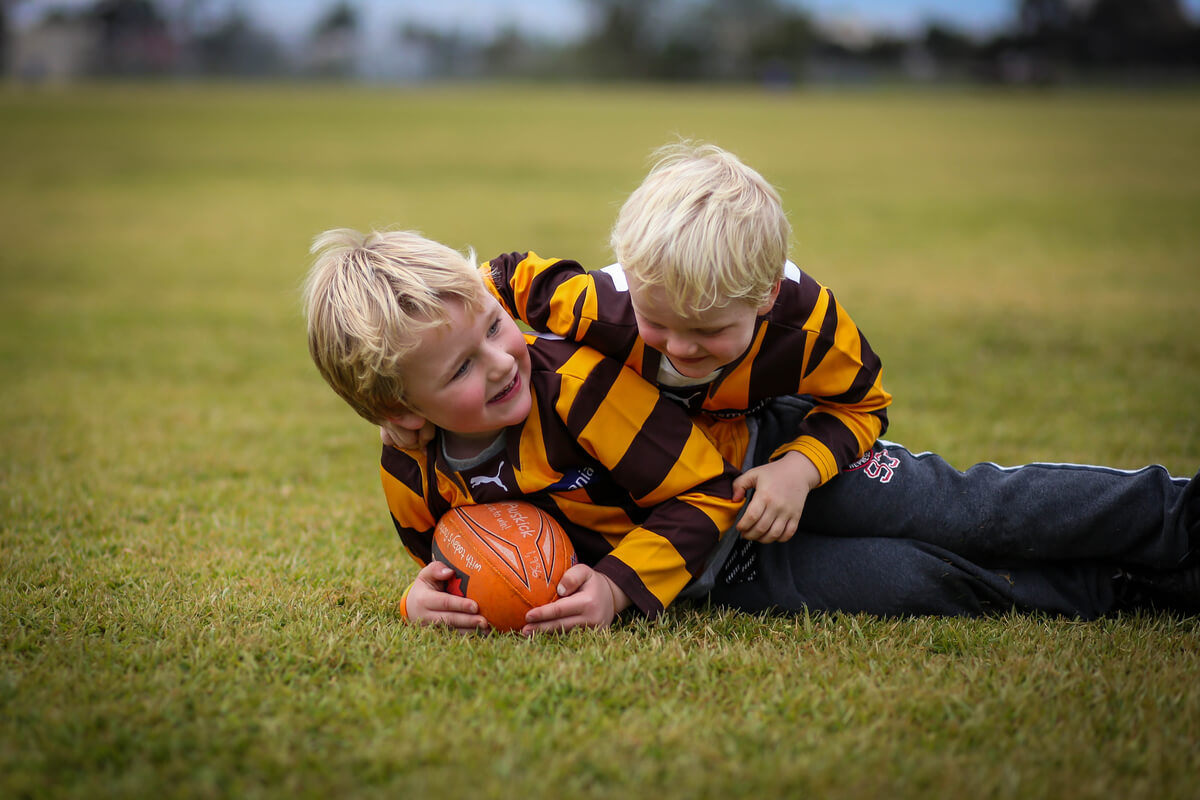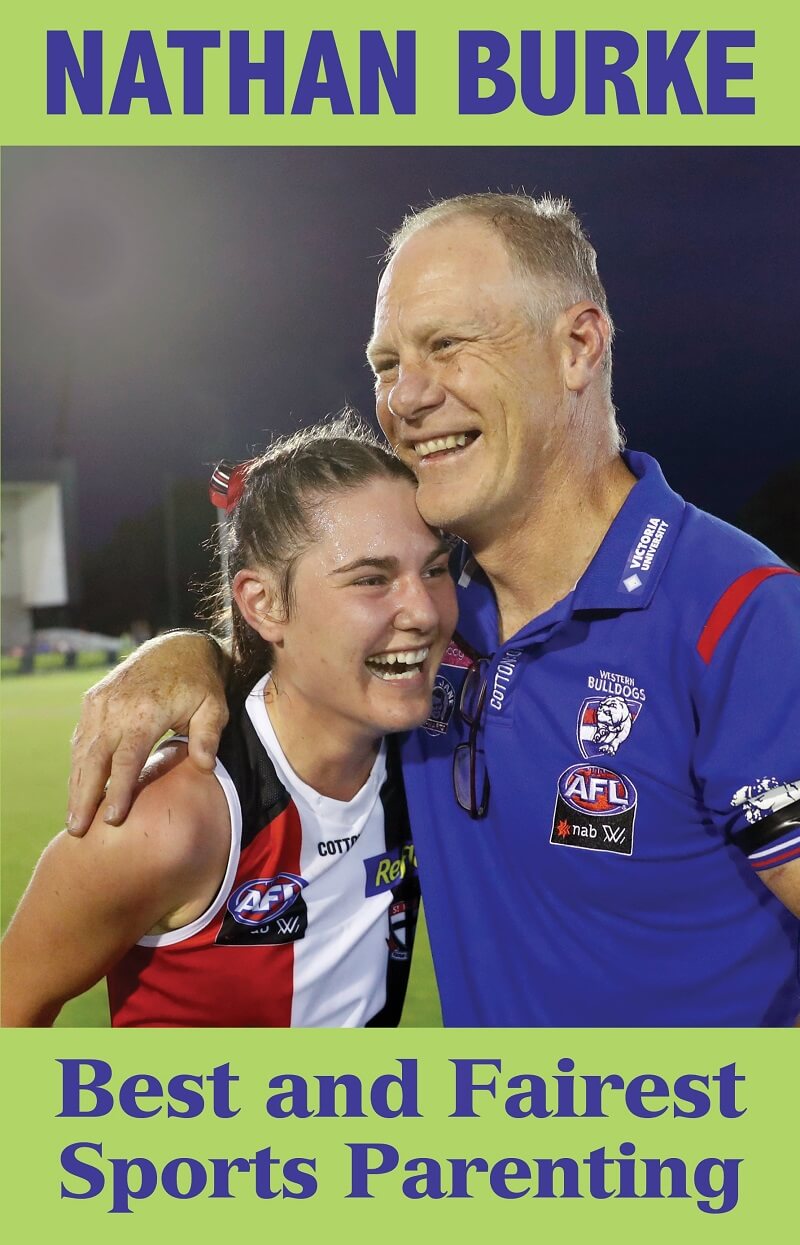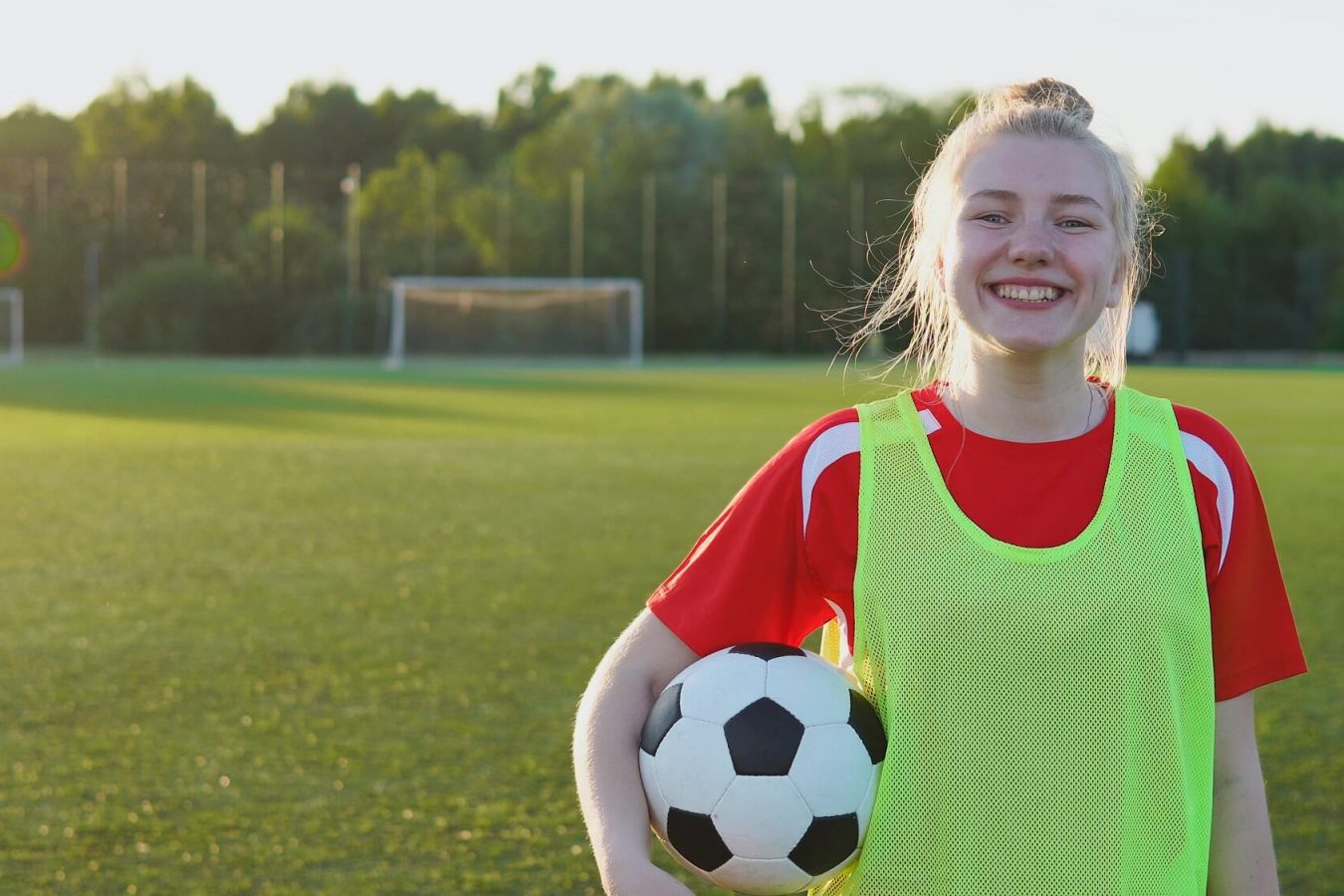
Are you too focused on your child winning at sport? In this extract from his new book, AFLW coach and football great Nathan Burke explains how you can take a better approach. Plus find out how to get a discount on the book.
It pays to understand that competition is a natural human instinct. Remember when our kids were smaller and we wanted them to go and get their pyjamas from their room. We would say, ‘I will count to see how long it takes you.’ The competitive juices; even for those as young as five years old; kicks in, and off they race up the hallway, hoping to get faster than last night’s time. We didn’t teach the kids how to do this, it just comes naturally. Although the pace I showed could have been to avoid getting caught by the monster that may or may not have lived under the stairs as I shot up to my second-floor bedroom.
When the Totem Pole Effect kicks in
The important thing is that at age five, losing is not devastating to a child’s self-esteem. It is when children reach seven and eight years old that they start to realise that there are other people in this competition, and the concept of comparison kicks in. Some psychologists call it the ‘totem pole effect’ whereby, in kids’ minds, they start to place the smart kids on top, along with the good-looking kids and the fast kids. It is at this age that kids start to understand that with every winner there is a loser. And if they are in the latter, it’s possible that their confidence and self-esteem will take a hit. Essentially, I’m not running for the pyjamas anymore just in case I don’t get faster than last night, and you think I am a loser.
Of course, no parent would ever think that, but remember we are dealing with young kids here.
And here is the killer punch – Nim Tottenham, Associate Professor of Psychology at Columbia University, says that the section of the brain that helps kids manage the big emotions of losing is the last to develop. This means they need lots of help coping.
Simply, your child is not mentally equipped to cope with the pressure and emotions that a ‘win at all costs’ attitude places on their developing mind. By forcing your child to deal with emotions they are as yet ill-equipped to manage, you may be doing irreversible harm.
It’s not just me saying this – it’s the scientists. I do recognise that, though the phrase ‘win at all costs’ is used here, this mentality should never be adopted in kids’ sports. Though, let’s not mistake never winning at all costs for never winning at all.
So what do we do about our kids’ fragile relationships with losing? How do we tread the fine line between having them compete and strive to win without inflicting psychological stress?
Though I don’t agree with the modern theory that every kid should receive the same trophy at the end of the season, or that we should banish scoreboards from junior games in case some kids feel sad about losing … I do think there is space between the ‘win at all costs’ and ‘there are no losers’ dichotomy.
This is the space that parents (and coaches) should operate. In other words, have a scoreboard, allow someone to be the winner, but handle the situation appropriately.
What can I focus on besides winning and losing?
One of the ways to do this is to understand what the success criteria is for your child and your child’s team. If you are unsure what these are then sit down with your child’s coach and ask the question, ‘What is my child working on?’ If the coach is any good, they will immediately be able to tell you. It should be things like ‘striking of the ball’, ‘shooting from outside the key’ or ‘first touch with her left foot’, et cetera. This will allow you to take your focus off of winning and concentrate on what your child is doing in the game.
It is impossible to win every time you play a game. No player in the history of sport has ever done that, so why should we expect our kids to be able to do it? It is far better to concentrate on our kids’ improvement. To achieve this, we need to understand and look at the things they are working on. In this way, success does not relate solely to what the scoreboard says – rather, it relates to what your child does in the game. In essence you can ‘win’ even when you ‘lose’.
Many parents only focus on the scoreboard because they don’t know what else to focus on. If this is you, ask your kids what they are working on, learn how the game is played and maybe even get out and have a kick or hit yourself.
You may just realise that the free throw line is further out than it looks from the sideline and you can cut your kid some slack when they miss one.
Or maybe next time you drop your kid off for golf lessons, grab a bag of balls and hit some yourself. I doubt every ball will go straight, and it may make you appreciate how hard the game is.
A useful exercise I always ask parents to do is sit and watch a professional game and see how many basic skill errors are made. You will need plenty of paper and a few pens as I guarantee the numbers will astound you. Sure the mistakes will often be overshadowed by glimpses of brilliance, but you’ll realise that even professional basketballers miss layups, soccer players miss from dead in front, tennis players serve double faults and golfers hit it in the water (and so will your kids, who aren’t professionals).
By placing more emphasis on improvement rather than winning you immediately lighten the load on your child.
And guess what – you can actually improve and win at the same time. These things are not mutually exclusive.

I become incredibly frustrated with coaches who cannot grasp this concept. They focus so heavily on skill development that they actively promote ‘not winning’ as a positive part of the game day. It’s basically whoever can hang on to the ball the longest is the winner; forget about the posts with the net in between.
It staggers me how they are allowed to get away with this. As an example, they will promote ‘keeping the ball’ and demand that every pass has to go to a teammate’s feet; even if this means passing to a teammate behind you or someone in a worse position; as long as your team keeps possession of the ball. I have seen junior teams at National Carnival level be fantastic at maintaining possession, but go nowhere near the goals. On every occasion they lost the game and we parents had to put our sports psych hats on and rebuild the confidence of kids who came with the hope of being competitive.
In my mind a far better option would be to teach the kids how to maintain possession as a means of scoring. Passing should be a means to an end (scoring), not simply a means of keeping possession. I understand there are game situations when you may need to simply maintain possession, but primarily the aim is to score.
Ideally the success criteria should be to maintain possession and work the ball into an area where you can score. If the team loses, then we can evaluate the game by how many times they passed the ball into a scoring position.
You can’t do any of these things properly if you have eradicated all scoring – winning and losing –from the game.
If a goal isn’t scored then that’s okay, as long as they made progress on their success criteria. If they do happen to end up on the right side of the margin, then guess what? You will have some happy kids who will be eager to turn up to training again next week.
Either way they have something to be happy about.

About the book – and how to get a discount
Best and Fairest Sports Parenting is published by Melbourne Books, RRP $32.95.
In the book, Nathan explains how to do the ‘right thing’ by your sports playing child, and increase the level of enjoyment between parents and their kids.
Readers of The Parents Website can get a special 10 per cent discount if they order from the Melbourne Books website here. Apply the discount code ISV10 at checkout.
About Nathan Burke
Nathan had an AFL career spanning 17 seasons at St Kilda FC, capturing numerous individual awards while captaining his Club, his State, and representing Australia in the International Rules Series. His individual highlight was being awarded the AFL Hall of Fame Membership and Legend Status in the St Kilda Hall of Fame.
Post-football, Nathan has started his own consulting company which focuses on high performance, resilience and leadership. He juggles this role with coaching elite-level women’s AFL at the Western Bulldogs – and standing on the sidelines supporting his three daughters.
Stay up to date with our newsletter here

